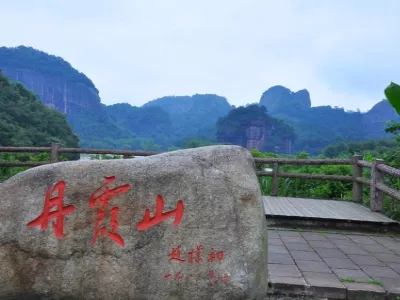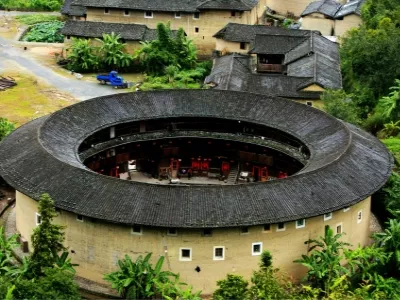Nestled in southern China's Guangdong Province, Zhaoqing borders Guizhou to the west. The Xijiang River, main branch of the Pearl River, flows through the city. The Tropic of Cancer also passes through Zhaoqing's northern territory.
Backed by the Beiling Mountains and facing the Xijiang, Zhaoqing commands the routes from South China to Guangxi. It administrates 2 districts - Duanzhou and Dinghu, 4 counties - Guangning, Huizhou, Fengkai, and Deqing, and oversees 2 county-level cities - Gaoyao and Sihui.
With gorgeous lakes, rivers, and peaks, Zhaoqing showcases the diverse natural scenery of Guangdong. Cruise the Xijiang River gazing up at the breathtaking Seven Star Crags. Lose yourself in bright yellow rapeseed fields blooming against the mountains. In Zhaoqing, immerse in the rustic beauty of rural Guangdong.
Consumption level
Zhaoqing has a relatively affordable cost of living and travel compared to other cities in Guangdong Province. Meals at local restaurants normally cost around 20RMB per person. Comfortable hotel accommodations average about 150RMB per night.
To maximize your budget, opt for express hotels located near top attractions like the Seven Star Crags and Dinghu Mountain. Use public buses and taxis to get around for just a few RMB per ride. Enjoy delicious local cuisine like fried carp with salted egg and rice noodle rolls from small eateries.
By choosing budget-friendly hotels, utilizing public transit, and sampling inexpensive food stalls, travelers can immerse themselves in Zhaoqing's natural scenery and culture without overspending. Focus your time and money on a couple highlights each day. With good planning, you can experience Zhaoqing's essence for around 200-250RMB or less per day.
Dinghu Mountain and Water
Rising along the Tropic of Cancer, the jewel of Dinghu Mountain captivates with scenic splendor. Ancient trees blanket mist-veiled peaks, while verdant pools and cascading waterfalls animate the landscape. Blissful serenity prevails, with butterflies fluttering through blossoming groves and birdsong echoing through secluded valleys. Meander along terraced boardwalks overhung with emerald foliage. Pause to admire panoramic vistas of cloud-wreathed summits interlaced with thundering cataracts. As sunlight filters through the canopy, lush primeval forest envelops you. Lose yourself for hours navigating wooded trails and discovering picturesque pavilions tucked within the mountain's embrace. When the path leads you to an unexpected waterfall or view, you'll be glad you ventured into Dinghu Mountain's natural sanctum. An ecological and scenic treasure perched atop the Tropic of Cancer, Dinghu's vibrant beauty lingers long after departure.
Starry Rock Smoke Rain
The sprawling stone carvings of Qixingyan create a spectacle rarely seen in Guangdong. Ancient temples nestle within the rock formations as misty peaks tower overhead, yielding scenic vistas at every turn. Follow winding trails through fern-fringed forests to discover stunning features like the Star-Viewing Platform's panoramic views and the Hundred-Buddha Cavern's massive carved images. When rainy days shroud the cliffs in ethereal fog, move through a wonderland of drifting clouds and ink-wash shadows. Late afternoons often bring golden light illuminating the cliffs, showcasing the grand scale of the carvings. As one of China’s largest collections of stone inscriptions and sculptures, Qixingyan impresses with artistic breadth. But its natural assets—secluded grottos, plummeting waterfalls, hanging orchids—are equally mesmerizing. Prepare to linger as you encounter scenic surprise after scenic surprise in this geological and cultural treasure trove.
Zhaoqing Ancient City Wall
Built in the Ming dynasty, the venerable city walls of Zhaoqing stand as enduring monuments to the city's role as a former regional capital. Ascend the steps to the top and immerse yourself in history while surveying the modern cityscape from this elevated vantage point. Gaze out across ancient battlements that once safeguarded the city below. Trace the walls’ meandering route through the urban fabric, appreciating their magnitude and strategic design. Though centuries have elapsed since conflict stirred these ramparts, a ponderous dignity still emanates from the weathered stone. Let your imagination wander back through time or simply enjoy the present-day view stretching to the distant horizon. Whether you’re intrigued by military history or architectural heritage, Zhaoqing’s lofty fortifications provide fascinating insights into the city’s eventful past. At sunset, observe the dark silhouette of the walls cast against colorful skies for a memorable look back through the ages.
Religion and Culture
Zhaoqing's Rich Religious and Cultural Tapestry
Situated just south of the Tropic of Cancer, Zhaoqing is an oasis within the mostly arid tropics. This "Emerald on the Tropic of Cancer" boasts lush vegetation, waterfalls, and thriving birdlife.
As a birthplace of ancient Lingnan native culture, Zhaoqing represents the intersection of Central Plain and Lingnan cultures. It has a splendid history and culture, being a core area where Lingnan native culture and Cantonese culture evolved. Zhaoqing was once the political, economic and cultural center of the Xijiang River basin, known as the "Famous Prefecture of Lingnan."
The Duan inkstones crafted in Zhaoqing are considered a treasure among the "Four Treasures of the Study." Zhaoqing is fittingly called "The Inkstone Capital of China."
The diverse local culture includes the "Guizi Opera" folk art form, dragon dances, rooster dances, and tea-picking songs. Zhaoqing also has a rich legacy of Lingnan native culture, Duan inkstone culture, Song culture, Dragon Mother culture, and Judge Bao culture.
Best Travel Time
Zhaoqing has a subtropical monsoon climate. The annual average temperature is 21.2 ℃, with rainfall mostly concentrated from April to September. The highest temperature is in July, with an average of 28.7 ℃. The winter in Zhaoqing is not very cold, and the summer is not very hot. It is a good tourist season all year round.Medical treatment
Here is some helpful information about medical care in Zhanjiang, China for an English travel website:Medical Care in ZhanjiangZhanjiang has several top-rated Tier 3 hospitals, including Guangdong Medical University Affiliated Hospital, Zhanjiang First Traditional Chinese Medicine Hospital, and Zhanjiang Central People's Hospital. There are also many conveniently located 24-hour pharmacies throughout the city for purchasing medication or over-the-counter remedies.Some major hospitals in Zhanjiang include:Guangdong Medical University Affiliated HospitalPhone: 0759-2387513, 2387528Zhanjiang Second People's Hospital Phone: 0759-2372160, 2372200Zhanjiang Second Traditional Chinese Medicine HospitalPhone: 0759-2209841, 2221753, 2283540With reputable hospitals, English-speaking staff, and easily accessible 24/7 pharmacies, travelers can feel confident getting medical treatment if needed in Zhanjiang. Be sure to travel with proper health insurance and documentation to facilitate any necessary care.Safety considerations
When at crowded places like train stations, bus terminals, and metro stations, keep a close eye on your belongings to prevent theft. Areas with high tourist traffic like Tiananmen Square also attract scammers, so tourists should be wary of unlicensed guides demanding money upfront. Avoid handing over any cash to solicitations on the street. Use registered taxi companies like the red Beijing taxis whenever possible. Keep valuables secured and hidden, avoid carrying large amounts of cash, and be alert in public transportation hubs and tourist sites. When needing assistance, go to authorized help points like the Beijing Tourist Information booths rather than individuals roaming the streets. Beijing is a generally safe city if simple precautions are taken. Report any incidents or suspicious activities immediately to the nearest police officer. They can also provide directions and other help. Enjoy sightseeing, but remain aware of the surroundings.


















